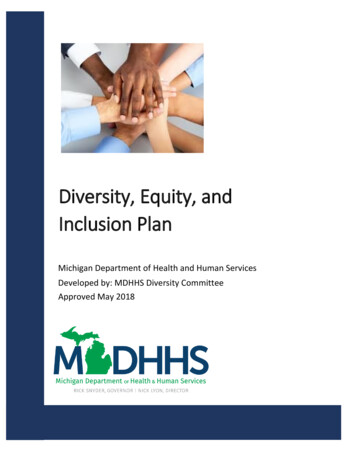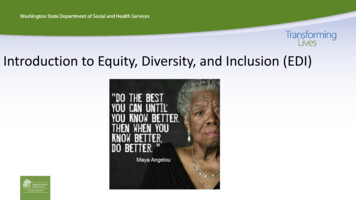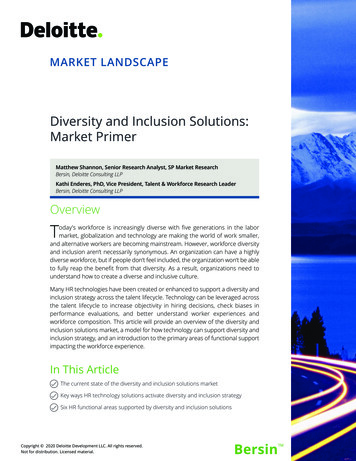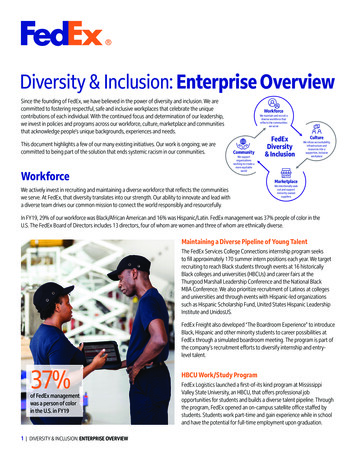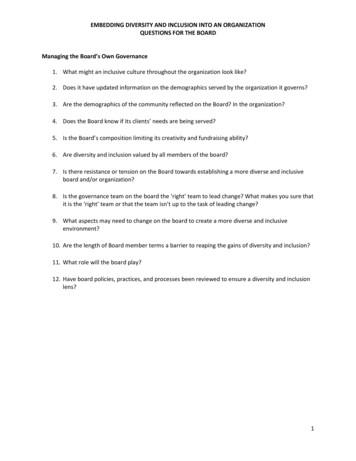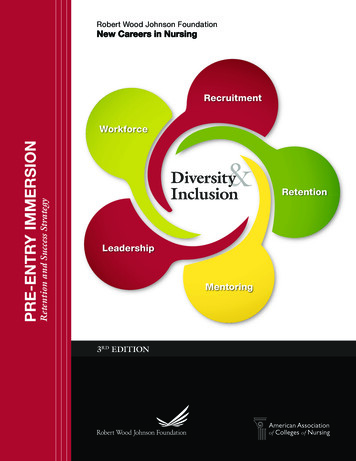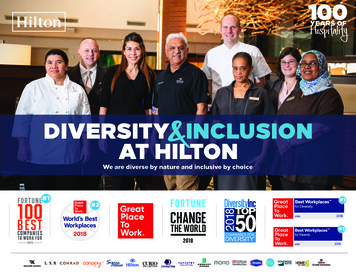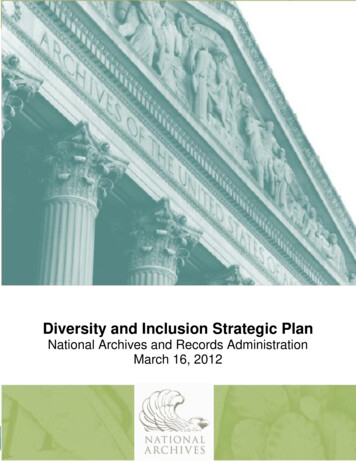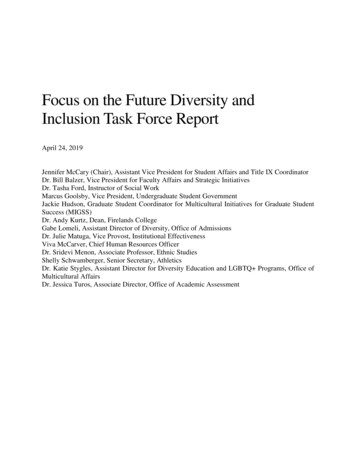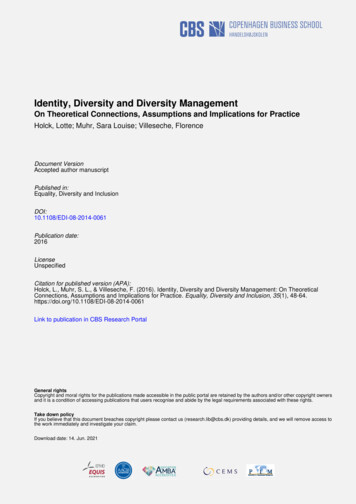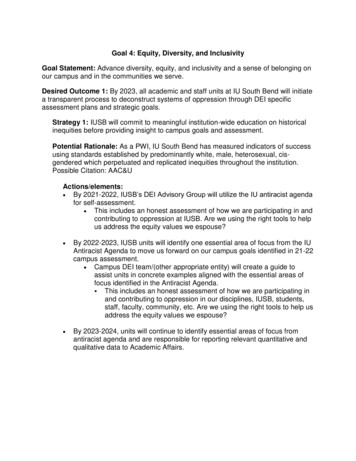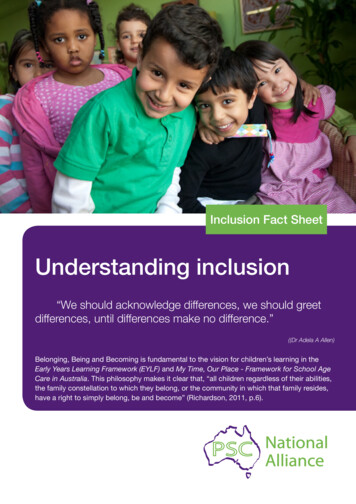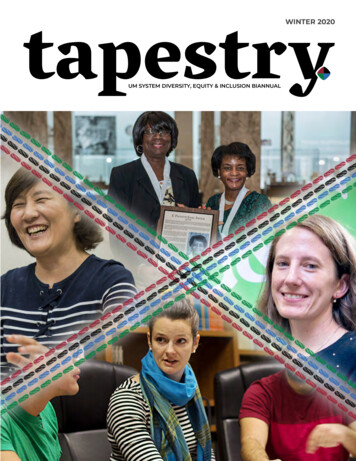
Transcription
WINTER 2020UM SYSTEM DIVERSITY, EQUITY & INCLUSION BIANNUAL
Susan WilsonUMKC Vice Chancellor, Diversity and InclusionWINTER 2020table of contentsPRODUCTIONUMKC Engages i n New Initiatives . 3Know Us Better . . 4Hail to the Chief . 5Engineering Success . 6IMSD Scholars Shine . 7SREB . . 8UMKC Recognized for Excellence in Diversity . 10Colorism’s Significance . 11International Honor . 12Computer Science Faculty Honored for Making a Difference for Womenin STEM . 14Teaching and Making History . 17Showing the Way . . 18Five Fearless Women Engineers on Fighting Impostor Syndrome . 20Hacking It . 21Daring To Do More . . 22Supporting Growth . 23Triumphant Return . 24Past, Present and Future . 25UMKC Student President Means Business . 26Accessibility Partnership . . 27A GEM of a Scholar . . 28Beloved Community . 29An App For That . 30Williams On Board . 31UMKC Vice Chancellor Honored With Statue . 32EDITORSKa t ly nn AdkinsInya BaiyeRyan GavinHarsha PaulART DIRECTIONWh it ney P ierceCONTRIBUTORSBrian Bo o t o nAndrew CarreagaRebecca CraineCharlene EmersonNicole Ga eh leClaire HasslerKelsey Hay nesAugust JenneweinBurk KroheAleksandar LetićMindy Lim ba c kJoh n Mart ellaroPa t ricia O’D el lBrando n ParigoSara h Po t t erTara P rind leSheena RiceJessica RogenUNIVERSITIES WITHIN THE UM SYSTEMUniversity ofMissouri-St. LouisMissouri University ofScience and Technology2 TAPESTRYWinter 2020To m Wag nerSt eve Wa lent ikUniversity ofMissouri-ColumbiaUniversity ofMissouri-Kansas CityUMKC Engages in New InitiativesOTapestry is published by the UMSystem Office of Diversity, Equityand Inclusion: bit.ly/UMTapestryACLU were in attendance.Steve Kraske, from KCUR’s“Up to Date” program wasthe moderator.Law professors were utilizedto do training throughout theuniversity, including faculty,student groups and thechancellor’s Diversity Council.On Dec. 10, a 2020 PresidentialElections: Prepare forPassionate Disagreement &Perceived Acts of Bias &Insensitivity on Campuswebinar was provided to preparethe campus for the upcomingpolitical season. The Agree toDisagree program will be ayear-long initiative.On another note, UMKCalso spearheaded the FacultyInstitute for Teaching InclusiveCurricula (FITIC). Led byMakini King, PhD, the Institutefocuses upon infusing diversityinto the curriculum on acampuswide basis. Faculty enterinto a structure program thatprovides guidance, resources andpeer assistance. The benefitof the program is that itresponds to the needs of anincreasingly diverse studentbody and prepares all students todevelop broader perspectives tooperate in a global environment.Faculty who complete theprogram and modify theircurriculum will receive a stipend.Integrating “InclusiveExcellence” action planningacross the UMKC campus hasbeen an ongoing initiative.While having an inclusiveexcellence plan is a good firststep, involving academic and administrative units is far more productive.All units convene a group to complete, review and revise diversity, equityand inclusion action plans. The plans are presented on a yearly basis tothe chancellor’s diversity council for recommendations and feedback.Using this method, progress has been made. For example, the Schoolof Biological Sciences increased retention rates by 10-15% by adding anew biology lab to strengthen the skills of students. This intervention alsodecreased grades of D, F or Withdrawal rates by 10%.The bottom line is making meaningful progress in diversity andinclusion is everyone’s job. We are proud that the UMKC campus hasrisen to the challenge.n college campuses across the country, issues of toleranceand freedom of speech loom large. The upcoming politicalelections will only create more polarization on campuses.For this reason, UMKC’s Division of Diversity andInclusion launched a new program entitled “Agree to Disagree: Engagingour First Amendment Rights Through Civil Discourse.” The program isa year-long initiative designed to educate students, faculty and staff aboutthe First Amendment and how to have constructive discourse. Withoutthis education, campuses can be one step away from a major incident.The “Agree to Disagree” program launched Nov. 5, 2019, with apanel discussion about the First Amendment. Missouri RepresentativesDan Stacy (R), Barbara Washington (D), as well as a member of theWinter 2020TAPESTRY 3
Know Us BetterMeet Cecily Hicks and Layla Padgett, your DEI and Title IX colleagues at theUniversity of Missouri SystemHail to the ChiefColleagues, friends celebrate Deborah Burris’ 36 years of service to the UM SystemCecily HicksCecily Hicks serves as the UM System’s Deputy Title IXCoordinator and Equity Officer. Hicks collaborates withcounterparts systemwide to provide support and resourcesthat enhance the university’s mission of promotingdiversity, equity and inclusion while also working to ensurea safe and secure university community. Prior to comingto the UM System, Hicks worked for almost 13 years asa Boone County Assistant Prosecuting Attorney with aprimary focus on prosecuting domestic violence and sexualassault offenses.STO RY BY: JES S ICA ROGENPH OTO BY: AU GU ST JEN N EWEINALayla PadgettLayla Padgett serves as the UM System’s Senior Diversity,Equity and Inclusion Specialist. She completed her finalpracticum placement for a Master of Social Work throughthe UM System DEI office in 2019 and continued to workas a Program Support Coordinator at the system aftergraduation. Padgett works to design, develop, implementand support systemwide programs and initiatives to createand foster an open and inclusive environment.4 TAPESTRYWinter 2020long line of well-wishers — colleagues, students and friends— queued up behind Deborah Burris in the MillenniumStudent Center Century Rooms to congratulate and celebratethe director of the Office of Diversity, Equity and Inclusionand chief diversity officer at the University of Missouri–St. Louis on 36years of service to the University of Missouri System.Burris, who retired on Nov. 1, has made her mark on each of the fourUM System universities, in myriad roles including leadership positionsin student admissions and financial aid, human resources, affirmativeaction, Title IX, diversity, equity and inclusive excellence. Establishingthe Chancellor’s Cultural Diversity Council and the university receivingthe Higher Education Excellence in Diversity Award from INSIGHTinto Diversity magazine three times are among her many noteworthyachievements at UMSL.Interim Chancellor and Provost Kirstin Sobolik served as MC duringthe event and spoke of Burris’ impact on UMSL.“Most important, Deborah has helped us create a culture thatencourages civil and constructive discourse, reason, thought andsustained dialogue and an environment of respect and appreciation,”Sobolik said. “I’m going to reiterate those last two words because I feelthat that defines Deborah: respect and appreciation.”Among the speakers were Ken Hutchinson, former UM Systemvice president for the Office of Human Resources; Alicia TurnerRoberson, president of the St. Louis Industry Liaison Group andAffirmative Action Specialist at Boeing; Catherine Wong from the St.Louis office of the U.S. Department of Labor; UMSL ChancellorEmeritus Blanche M. Touhill; Dorothea Scott, Compliance Manager,Equal Opportunity Programs in the Office of Diversity, Equity andInclusion; and Jerome Morris, the E. Desmond Lee Endowed Professorof Urban Education in the College of Education.The group called out Burris’ attributes and achievements, whichranged from her vision, ethics and class to her contributions to the St.Louis ILG Disability and Veteran Vendor Fair and Black Writers StudentAssociation to anecdotes about her relationships with colleagues and herhandling of difficult work situations. In addition, Scott presented Burriswith a scrapbook of memories from her UMSL career.And she’s not done helping people. Sobolik announced that Burriswill be working at Episcopal City Mission as an ordained minister aidingincarcerated, adolescent black males to navigate the system.Finally, Burris took the microphone to talk about her time at UMSLand thank her colleagues and collaborators.“We do transform lives,” Burris said. “Every single one of you havebeen a part of that, that process of helping to shape, transform the livesof students, as faculty and staff. I’ve been blessed to be on the journeywith you. So, again, thank you all for being here. It’s been awesome. Iwant to challenge each and every one of you to support one another, toencourage one another, to love one another, and again, to continue to dothe good work that goes on here.”Winter 2020TAPESTRY 5
Engineering SuccessNew program offers summer research for students from HBCUsTennessee State University students AhmedOsmand (foreground) and Sam Wreh wereamong the students selected for MissouriS&T’s Summer Engineering ResearchAcademy. They are shown here working onfiber optic sensors for use in theirmetallurgical engineering research.IMSD Scholars ShineSTORY BY: A N DREW CA RREAG AFour IMSD Scholars receive Outstanding Poster Presentations at nationalABRCMS ConferencePHOTOS BY: TOM WAG NERSix undergraduate students from Tennessee State University inNashville and Tuskegee University in Tuskegee, Alabama, spenttwo months this summer conducting engineering research atMissouri University of Science and Technology as part of a newprogram designed to encourage underrepresented engineering studentsto consider pursuing graduate studies.The six students took part in Missouri S&T’s Summer EngineeringResearch Academy (SERA), sponsored by Missouri S&T’s College ofEngineering and Computing (CEC).“This was a new program, and it was a tremendous success,” says Dr.John Myers, CEC associate dean and a professor of civil, architecturaland environmental engineering. “We wanted to introduce moreundergraduate students from underrepresented groups to the excitingresearch going on here at Missouri S&T, in hopes of generating interestin going on to graduate school after they finish their bachelor’s degrees.We plan to continue to offer this program in the future.”Myers credits much of the program’s success to the involvement andsupport of the Missouri S&T faculty research mentors and their researchteams, along with the engineering deans at Tennessee State Universityand Tuskegee University, both historically black colleges and universities(HBCUs). The deans are Dr. S. Keith Hargrove of Tennessee State, whoearned a master of science degree in engineering management fromS&T in 1987, and Dr. Heshmat Aglan of Tuskegee.Dr. Kelley R. Wilkerson, assistant teaching professor of materialsscience and engineering, is the program director.“Each of the students worked with an S&T research group based ontheir expressed interest areas of metallurgical engineering, automation oradvanced manufacturing,” Wilkerson says. “Each student spent about 30hours a week on their research project, and spent their remaining timeexploring the university, touring labs, attending personal developmentworkshops and participating in social activities.”6 TAPESTRYWinter 2020STO RY BY: H ARS H A PAU LESummer Engineering Research Academy (SERA) participants,front row, from left: Langston Hines of Tuskegee University,Ahmed Osmand of Tennessee State University and Sam Wrehof Tennessee State University; back row, from left, JoshuaCampbell, Chris Buford II (standing) and Branden Currie, all ofTennessee State, and Dr. Kelley R. Wilkerson, assistant teachingprofessor of materials science and engineering at S&T andSERA program director.The two-month program concluded with a poster session, duringwhich the students presented the results of their research.Dr. Richard W. Wlezien, vice provost and dean of CEC, creditsMyers with developing the program.“John deserves a lot of credit for establishing connections withTennessee State and Tuskegee University to get this program off theground,” Wlezien says. “This was a very successful first year for theprogram, and I see great opportunities for it in the future.”arlier this year, 23 students who are part of the Initiative forMaximizing Student Diversity (IMSD) Scholars programparticipated in the Annual Biomedical Research Conferencefor Minority Students (ABRCMS) in Anaheim, California.Of those, 19 presented their research, which was a record-best for theacclaimed MU program.For the ninth year in a row, at least one IMSD Scholar from MU hasbeen selected as an Outstanding Research Presentation AwardRecipient in their category. Few participating schools have been able todo so consistently each year.Four of the MU student participants were selected by judgesfor recognition. The ABRCMS Conference included over 2,500undergraduate research presentations with only 395 presentationsselected for the award.The conference concluded with an awards banquet with a 5,100ABRCMS attendees, which was a record number in attendance.Undergraduate Director of IMSD Scholars Brian Booton noted,“The camaraderie and scientific prowess exhibited was an omnipresentreminder of the bright hope for our future!”Learn more about IMSD byvisiting imsd.missouri.edu.PH OTO COURT E SY OF : BRIAN BOOTONThe MU award-winners for OutstandingPoster Presentation Award include:BENJAMIN JONES, JUNIOR, B.S. BIOLOGICAL SCIENCESFaculty mentor: Erika Boerman, Medical Pharmacology& PhysiologyPoster title: Decreased Metalloprotease Expression Contributes toImpaired Sensory Vasodilation in Mesenteric Arterieswith Inflammatory Bowel DiseaseABRCMS scientific discipline category: Physiology & PharmacologyDOMINIQUE JOSEPH, JUNIOR, B.S. BIOLOGICAL SCIENCESMU faculty mentor: Charlotte Phillips, BiochemistryPoster title: Postnatal Inhibition of Myostatin and Activin-A in theOsteogenesis Imperfecta Murine (oim) ModelABRCMS category: BiochemistryALISHA PERRY, JUNIOR, B.S. BIOLOGICAL SCIENCESFaculty mentor: Elizabeth Parks / Nutrition & Exercise PhysiologyPoster title: Hepatic Short Chain Fatty Acid Oxidation (SCFA) inNonalcoholic Fatty Liver DiseaseABRCMS category: Physiology & PharmacologyCLAYTON IVIE, SOPHOMORE, B.A. SECONDARY EDUCATIONFaculty mentor: Jaqueline Limberg, Nutrition & Exercise PhysiologyPoster title: Sex Differences in the Effect of Intermittent Hypoxia onSympathetic Baroreflex Control of Blood PressureABRCMS category: Physiology & PharmacologyWinter 2020TAPESTRY 7
Finding a HomeAs a member of SREB, I now have support in theform of financial assistance, but more importantlyin career counseling and preparation, networkingopportunities, and accessibility to mentors andfaculty members for support. These resources areinvaluable as I work through my degree programand prepare for a career as a minority educator inthe college/university environment. I am sothankful for this opportunity and to the yearlySREB Institute for Teaching andSREB helps minority doctoral students succeedSTO RY BY: C H A R L E N E E M E R SONNo matter your background, earning a doctoral degree isa demanding task. Many graduate students face challengesranging from developing a productive relationship withtheir advisor to pioneering research in their chosen field.Beyond the usual challenges of graduate school, minority studentsoften feel isolated by the absence of underrepresented groups in theirfield. Since 1994, the Southern Regional Education Board’s (SREB)Institute on Teaching and Mentoring has helped thousands ofminority PhD candidates complete their doctorates and achievesuccess as faculty members.The SREB Institute on Teaching and Mentoring is the nation’slargest gathering of PhD students from underrepresented groupsand faculty of color. More than 1,000 scholars attend theconference each year. Two-thirds of the participants are women,nearly two thirds are black, one in four is Hispanic, seven percent areAmerican Indian/Native Alaskan and four percent are Asian.This year, 16 students from across the University of MissouriSystem attended: Precious Hardy, Stephanie Hernandez, DarvelleHutchins, LaShawnda Kilgore, Dena Lane-Bonds, Ransford Pinto,Cydni Robertson, Yanni Snowden-Bullock, Dana Thompson andDaphne Valerius from MU; Annie Derrell and Salome Wilfred fromUMKC; Ontlametse Molathegi from Missouri S&T; and Ericka Cables,LaChrisa Crenshaw and James Jordan from UMSL.The program has made a major impact on the fellows. LaChrisaCrenshaw, who will complete her doctorate in Social Work in 2021,said, “The support SREB has provided through mentorship, as wellas additional workshop training to prepare me for the research anddissertation phase of my journey, has helped me understand somebest practices to utilize to help me complete my doctorate degreewith success.”Precious HardyEducational Psychology, MUThe SREB Doctoral Scholars Program hosts the annualconference to advance efforts to diversify the professoriate inuniversities and educational systems across the country. Theprogram provides layers of support to underrepresented Ph.D.students, including mentoring, funding and career services.NaTashua Davis, MU interim vice chancellor for the Divisionof Inclusion, Diversity & Equity, Ty-Ron Douglas, MUassociate professor for Educational Leadership & PolicyAnalysis, Jeni Hart, MU dean and vice provost for GraduateStudies and Jenny Lundgren, UMKC dean of the School ofGraduate Studies, served with others as mentors to providean educational support system for scholars of color in theirrespective fields. Significantly, 2019’s fall semester was the firsttime that all four UM System institutions were represented byfaculty and staff to recruit students, postdoctoral fellows andfaculty to positions within the UM System.Over the past 26 years, the SREB Doctoral ScholarsProgram has helped nearly 1,000 underrepresented studentsearn their Ph.D., and as of 2019, it is currently supporting 400students pursuing doctorates. The program helps save bothWinter 2020James E. Jordan Jr.Business Administration, UMSLBeing a part of SREB is like finding yourtribe when you’re lost in the wilderness.As a Black first-gene
achievements at UMSL. Interim Chancellor and Provost Kirstin Sobolik. served as MC during the event and spoke of Burris’ impact on UMSL. and thank her colleagues and collaborators.“Most important, Deborah has helped us create a culture that encourages civil and constructive discourse, reason, thought and
